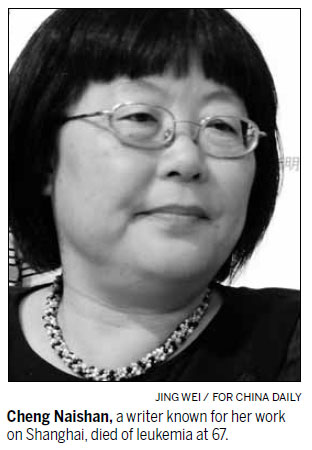Death ends 'great love' for Shanghai
Updated: 2013-04-23 08:08
By Zhang Kun in Shanghai (China Daily)
|
|||||||||||

Shanghai writer Cheng Naishan, 67, died of leukemia early on the morning of April 22.
Recognized as a voice of Shanghai, Cheng had a career documenting the city's history, legacy and anecdotes.
Her latest works include a column titled The Swan Pavilion in Shanghai Literature, and a series of six essays composed in Shanghai dialect, published in Xinmin Evening News from last November to March 13.
The six essays recounted the cultural legacy of Shanghai, including detailed accounts of old stories about facial cream, tailors and coffee parties.
"She can write adeptly about the lower-class life experience of dumping the chamber pot, as well as upper-class social life between coffee cups," says Lyu Zheng, editor of the Shanghai Dialect column for Xinmin Evening News, praising Cheng's accurate recording of the city's history.
"They are trivial stories of the past, but somehow reflect the changes of Shanghai," Cheng used to say about the Swan series.
Cheng was born in Shanghai in 1946 to a family of established bankers. She moved with her parents to Hong Kong temporarily, from 1949 to the mid 1950s. She started creative writing when she worked as a teacher of English after graduation from college in Shanghai. Her first collection of short stories, Death of a Swan, was published in 1982.
Her award-winning novel The Blue House was semi-autobiographical. It tells about a senior financial executive and his family that have weathered 30 years of political vicissitudes. It was translated into English, French and Esperanto.
Cheng turned to non-fiction writing in the 1990s and published a series of books: Shanghai Tango, Shanghai Lady, Shanghai Fashion, Shanghai Roman, Shanghai Saxophone, and others. Shanghai Gentleman, the latest, has just been translated into English, and will come out later this year.
"Naishan has great love for the city of Shanghai, especially the district of Jing'an," says her husband, Yan Erchun. "She was born and raised here. There are endless stories she wanted to write about Shanghai."
Cheng was a dedicated and productive writer. "She would say a day without writing was not worth living," Yan says by phone. Late in her career, the history of Shanghai became a heated subject and "even people who neither lived here nor know about it" wrote about Shanghai and often told untrue stories. "She always wanted to write more and believed a metropolis like Shanghai was worth writing about," Yan says.
Cheng was diagnosed with leukemia in the winter of 2011. Despite chemotherapy and other treatments, she went on with her writing whenever she could.
Lyu from the Xinmin Evening News received a phone call from Cheng in October 2012. "She was laughing and joking that she just made a narrow escape from death," Lyu says. Cheng discussed with the editor about her ideas for a series of pieces for the column.
"She would call me every time she filed the story, sharing details behind each piece, and discussing the accurate expression in Shanghai dialect," Lyu recalls. "She was a quick hand, and I published her pieces as soon as they arrived."
Cheng's death will leave a gap in the lineage of the cultural narrative of Shanghai, Lyu says.
Cheng was a writer who caught hold of the spirit of old Shanghai, says Wang Xiaoying, a fellow woman writer in Shanghai. "Few writers wrote well about the city. Cheng Naishan is a most outstanding of us," she says.
Cheng lived in Hong Kong temporarily in the 1990s. She worked as the Hong Kong correspondent for New Weekly and wrote stories that ranged from outlining the city cultural landscape to an exclusive interview with its most famous comedy movie director, Stephen Chow.
zhangkun@chinadaily.com.cn
(China Daily 04/23/2013 page20)
Today's Top News
Net forex purchases for fourth month
No new stimulus needed: Experts
Chinese president appoints 5 new ambassadors
No H7N9 transmission between humans: WHO
Health new priority for quake zone
China, ROK criticize visits to shrine
Sino-US shared interests emphasized
Entrepreneurs see potential in market
Hot Topics
Lunar probe , China growth forecasts, Emission rules get tougher, China seen through 'colored lens', International board,
Editor's Picks

|

|

|

|

|

|





